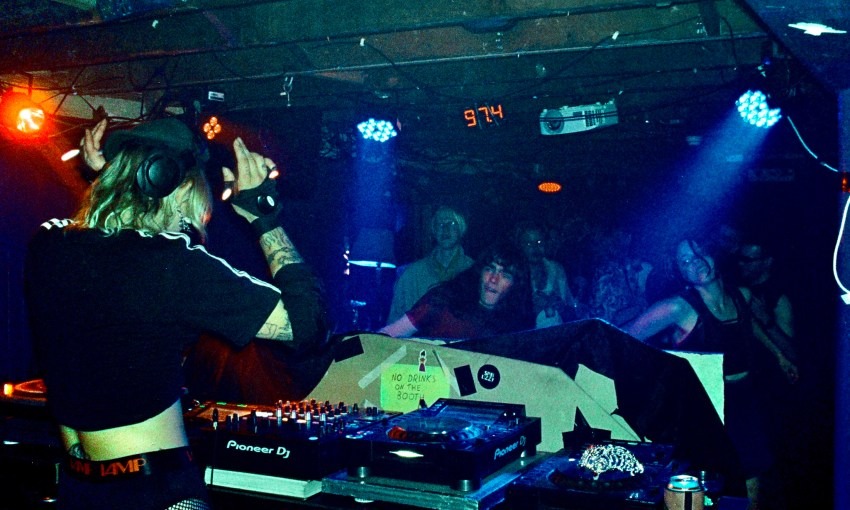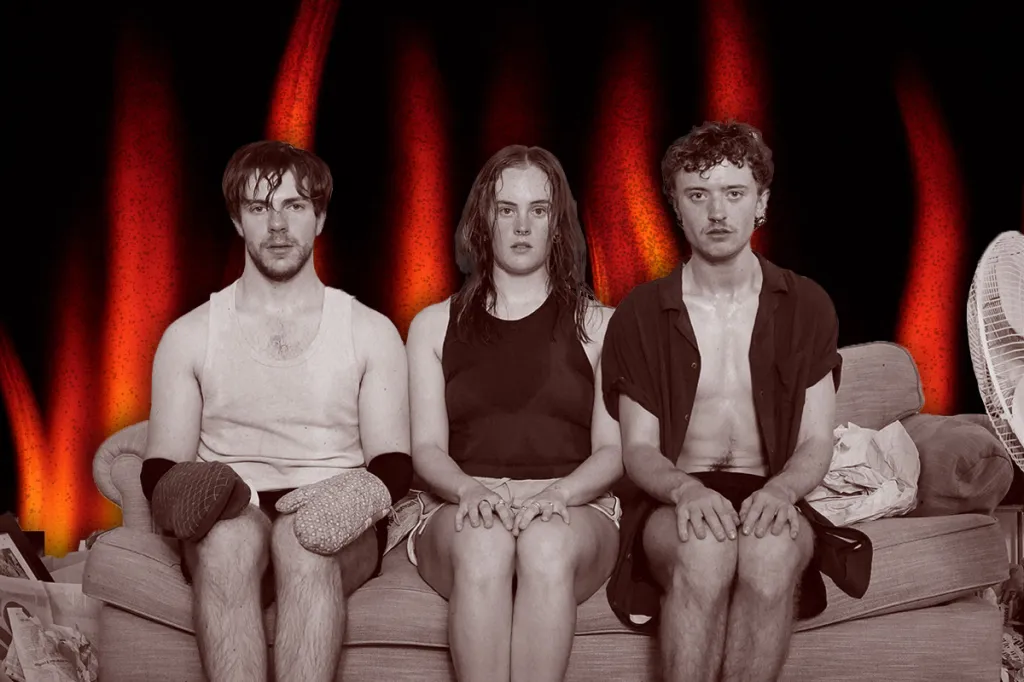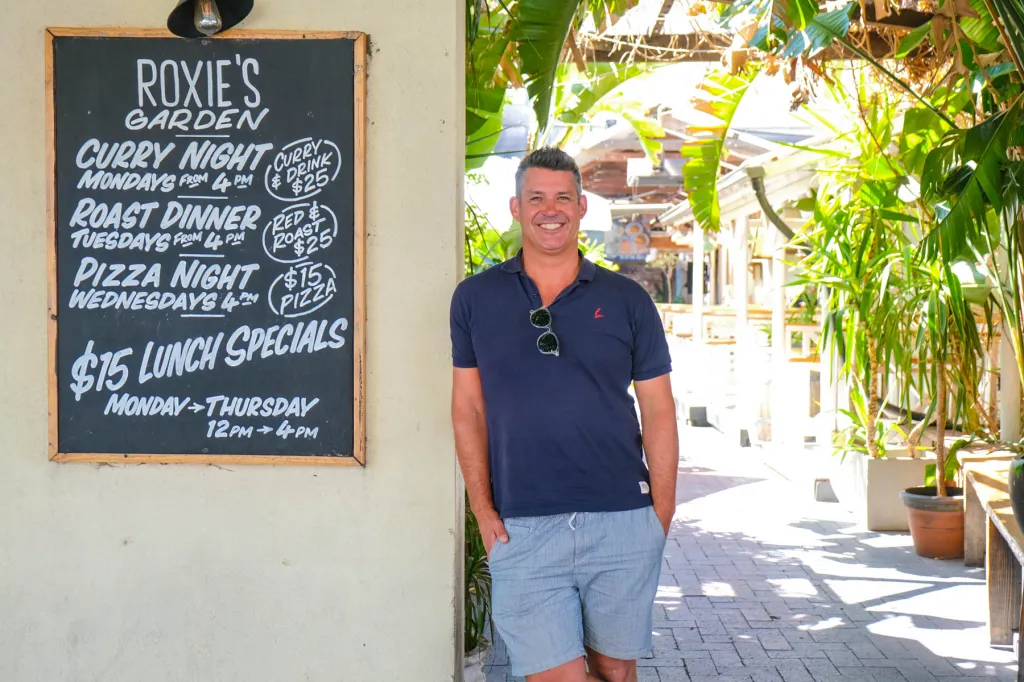‘Once they’re gone, they’re gone’: Adelaide alternative venues fight to survive

Three venues around Hindley Street including the city’s only metal dive have closed in the last month, while alternative bar Ancient World is battling to prevent the same fate. CityMag talks to operators about fighting to stay open in tough times, and the cultural cost of losing.
Chelsea Zerna and Hugh Scobie took over Ancient World in January 2021, after interacting with the bar for years prior: Chelsea as a bartender and Hugh as a promoter and DJ.
After nursing the bar through turbulent Covid times and its hammer-blow to live music, and now hit by a cost-of-living crisis, the duo revealed on their Instagram last week they’re dangerously close to closing.
They’re feeling the heat of the same issues as their now defunct neighbours Enigma, 1000 Island and Wnderland, telling followers: ‘If you have been thinking of popping into the shows we have coming up in December and onwards, then now is the time – we can’t do it without you!’
In January this year, the rent for Ancient World increased by 12 per cent – another price hike along with the cost of stocking the bar, keeping kegs gassed and cleaning products to eradicate nightclub nasties.
The bar has been hit by the cost-of-living crisis threatening a night out, with many punters no longer having the disposable income they used to for getting around local venues.
“Obviously, we want more people to come in and spend more money they have, but we know that’s not really practical for a lot of people,” Hugh says.
“We know a lot of our immediate community, like our friends, don’t have the money to be able to come out because a lot of them by the time they’ve paid their rent, petrol, groceries, actually don’t have any money.
“And this is people who were comfortable living like a year ago.”

Ancient World gigs go off. This picture: Emerald
Hugh has another job outside of Ancient World and was able to take a pay cut in his wages from the bar. This, along with putting their prices up in March, has helped them last this long.
“We tried to hold off [raising prices] for as long as possible due to us knowing who our clientele are,” Chelsea says.
“By the time March [2023] came around, I got advice from my accountant that [prices] need to go up otherwise you’re not going to make it through.”

Ancient World’s entrance is hidden behind Conrad Lane
Chelsea and Hugh say their reason for posting the reality of the situation on their Instagram was to raise awareness about how the economic situation is hurting Adelaide’s art community.
You might like
“For me, with the business, it feels like I’m trapped in this sort of abusive relationship where I’m constantly like… ‘we’ll just hold out for this summer’ and ‘maybe next weekend, it’ll be really busy and the sun will come out and everything will be fine’,” Hugh says.
“It’s exhausting.”
“The smaller places that are owner-operated, those are the ones that will really take the hit and I feel like the alternative scene really needs places like us,” Chelsea says.
“Without us, it’ll be harder for younger bands who might not be big enough to play in a bigger venue yet.”
Smaller venues like Ancient World, Jive and formerly Enigma are West End staples that take a chance on younger performers and play a crucial role in our gig economy.
Engima closed just short of 25 years of operations, Jive just celebrated its double-decade birthday and Ancient World is close to celebrating its 10th in 2024, with Chelsea and Hugh still optimistic they’ll make it there.
They’re hoping to throw a party in February for the occasion despite being “on a real knife edge” of operating.
Brad Cameron, one of the founders of Ancient World, is eager to celebrate the birthday with Hugh and Chelsea, agreeing the venue is crucial for the creative culture of the city.
“Hugh and Chelsea should be proud that it’s something they’re doing, and I think they’re doing a fantastic job,” Brad says.
“[Ancient World] is the kind of place that allows different performers, musicians, or artists to get to meet each other and decide to put on new shows and also to grow their audiences.”

Chelsea raises a glass to Adelaide’s alt scene. This picture: Liam Somerville
“There is a lot of love in the community for this space and for other small venues,” Hugh says.
“The Enigma closure is a good indicator, they had lines of people going around the block who probably hadn’t been there for a long time, but people do really care.”
Hugh is referring to Enigma’s free farewell party, which owner Eric Ott put on at the venue on November 17. Roughly 700 people showed up, with the line for drinks stretching 30 metres down the road.
Since opening in 1999, Enigma Bar would champion heavy, abrasive and loud music, and would bill national and international punk, hardcore and metal musical acts.
“Most other venues would have been too scared to give that style of music a punt and survive,” says Eric, who is fittingly wearing a black Pantera t-shirt on the day CityMag spoke to him.
“We just wanted to give people a bit of a home.”
That was certainly the case, as Enigma welcomed punters with exposed tattoos, studded jackets and outrageous hair – the kind of look a normal venue operating in the early noughties would reject as door policy.

Enigma bar was a big piece of Adelaide’s musical backbone
Most importantly though, the multi-storey, multi-stage West End hangout (which boasted, for a period, dial-up internet and a sausage sizzle) would book bands other venues in the postcode 5000 would sneeze at.
When CityMag asked Eric whether he was aware of how much of an impact his venue made on Adelaide, he thinks before he answers.
“On the night when people came up to tell me how much their lives have changed because of Enigma, and how the venue was something for them to go to, it was pretty incredible,” Eric says.

The life-sized Predators guarding the entrance (part of $20,000 worth of metal-fabricated installations) solidified Enigma Bar’s reputation as a metal venue.
Subscribe for updates
Tam Boakes is the founder and operator of Jive, and has been around the traps for as long as Eric. She says Enigma Bar’s closure is a “devastating” loss for the city.
“Enigma, like many dedicated live music venues, was a place that nurtured and grew our music community,” she says.
In the 25 years Eric ran Enigma bar, he worked the books, pulled pints behind the bar, and often worked the door by affixing your wrist with a shoddily-drawn X.
“It became a safe venue for the metal people,” Eric says, smiling. “Some people were scared to come to that part of town in those early days because of the street’s reputation but our crew didn’t worry about it.”
Chelsea says it’s venues like Enigma and Ancient World that have character, as the owners work the bar and put that love into it.
“They don’t have the venue just for their portfolio or for a dollar sign, they have the venue to share and grow the community that they’re part of,” she says.
When Eric announced Enigma’s closure on Facebook, he cited the same issues Ancient World are navigating: rising costs across rent, electricity and insurance, as well as difficulty booking bands, that made continuing operations “unsustainable.”
Eric tells CityMag the managers of the venue’s property wanted to increase the rent by 30 per cent.
To make matters worse, earnings on the bar dried up by 30 per cent since the Reserve Bank of Australia’s first of 11 rate rises this year, he says.
Chelsea says Eric’s plight is in line with what she’s heard across the hospitality industry.
“That’s huge because that 30 per cent could be the thing that either makes you break even, or it could be the thing that fixes your broken fridge or the plumbing if something goes wrong,” she says.
On top of that, Eric has found it difficult to book touring interstate bands for November and December, describing the calendar as “very lean”.
“A lot of those bands used to play at our venue and at Jive… now they are going elsewhere,” he says.

Before Enigma, Eric was a booking agent at live music venue Cartoons and The Venue, as well as a touring operator of Scorpion Entertainment.
When asked about her experience booking bands for the start of the summer, Tam says Eric’s assessment is correct.
“It’s the toughest times I’ve ever known,” she says.
Jesse Coulter works at the local music company Five Four Entertainment and is the venue booking manager of Rundle Street pub and live music venue, the Crown and Anchor.
He tells CityMag he is also saddened by the closure, but that it is emblematic of the economic fronts battering music venues right now.
Jesse says things like, “rapidly escalating costs, the lower bar takes, the sometimes-unpredictable ticket sales, the difficulty of staffing, and many other ongoing issues,” are impacting the industry.
CEO of not-for-profit advocacy organisation Music SA, Christine Schloithe tells CityMag she is aware of the challenges facing beloved – and “infamous” – small, live music venues.
“Those same live music venues are doing it tough and we’re losing them, so pay it forward: go see a live gig at a local venue and raise a glass or two to Enigma,” she says.
The community that frequented Enigma for its 25 years took to social media to mark the loss with 840 comments citing how it will be missed, and stirring up nostalgia.
Ancient World hopes their comment section doesn’t meet the same fate. Chelsea says their post letting followers know their struggles garnered 1400 likes and about 200 reshares, which was a bigger online response than they expected.
“We had a few different groups come through on Friday and Saturday who saw the post…we weren’t quite as busy as I thought we were going to be.
“We did the post on a Thursday, and I feel like a lot of people already have plans for the weekend by then but I’m hoping that we keep getting people trickling through.”
Hugh and Chelsea are grateful for their supporters and have budget drinks and non-alcoholic options so their venue is more accessible for those on a budget or who don’t drink.
“I think it’s really important for all cities to have an underground scene for people who are doing stuff out of the norm,” Chelsea says.
“It means that there’s more creativity going around the city, and there’s more safer spaces for people who like to live their lives a bit more alternatively.”
“Spaces like this, and other similar spaces in the city – once they’re gone, they’re gone,” Hugh says.

